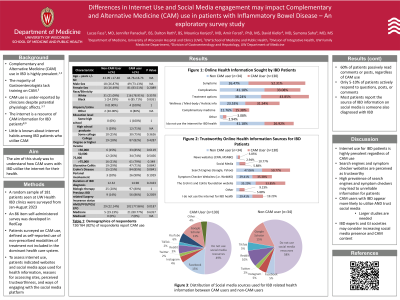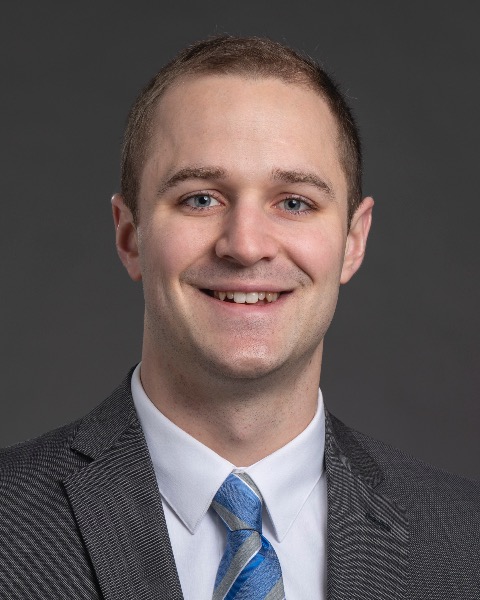Sunday Poster Session
Category: IBD
P0865 - Differences in Internet Use and Social Media Engagement May Impact Complementary and Alternative Medicine Use in Patients with Inflammatory Bowel Disease: An Exploratory Survey Study
Sunday, October 27, 2024
3:30 PM - 7:00 PM ET
Location: Exhibit Hall E

Has Audio

Lucas Fass, MD
University of Wisconsin School of Medicine and Public Health
Madison, WI
Presenting Author(s)
Lucas Fass, MD1, Jennifer Panackal, BS1, Dalton Roth, BS1, Mounica Konjeti, MD2, Amir Forati, PhD1, David Kiefer, MD2, Sumona Saha, MD, MS2
1University of Wisconsin School of Medicine and Public Health, Madison, WI; 2University of Wisconsin Hospitals and Clinics, Madison, WI
Introduction: Inflammatory bowel disease (IBD) providers report a lack of knowledge to counsel patients regarding complementary and alternative medicine (CAM). Yet, CAM use amongst IBD patients is highly prevalent. How patients with IBD obtain information about CAM is largely unknown. The goal of this study was to identify internet habits of IBD patients who use CAM versus those who do not.
Methods: An 86-item survey was administered to a random sample of 181 adult patients seen in the IBD clinic at a tertiary care IBD center in the upper Midwest from 1/2023 to 8/2023. CAM use was defined as self-reported use of non-prescribed treatments which are not a part of the dominant health care system. Survey items pertaining to internet use included websites frequented, use of social media, and reasons for accessing those sites. For numerical variables, the t-test was applied, while categorical variables were analyzed using exact Fisher tests. A Random Forest Classifier analyzed multivariate data.
Results: 164 (90.6%) IBD patients completed the survey: 99 (60.0%) with Crohn’s disease and 65 (40.0%) with UC. 79% (N=129) reported internet use. Overall, 130 (79.3%) patients reported CAM use (Table 1). Of internet users, 66% (N=86) report using the internet for information related to IBD symptoms, complications, treatment. Search engines, symptom checkers, and the Crohn’s and Colitis Foundation were identified as the primary “trustworthy” online sources by 78% (N=101) of patients, irrespective of CAM use. While not statistically significant, more CAM users identified social media as a trustworthy source of health information (10% vs. 5%, p >0.05). CAM users were also more likely to use social media platforms for IBD related information (CAM: 42% vs non-CAM 33%, p >0.05). Facebook was the most utilized platform. The most frequent way of engaging with social media regardless of CAM use was passively reading posts of other patients’ symptoms/experiences (CAM: 32%, Non-CAM: 35%, p >0.05).
Discussion: Internet use for disease-related information is highly prevalent among IBD patients regardless of CAM use. Search engines and symptom checkers were frequently rated as trustworthy, though these sources may lead to non-peer reviewed medical information. CAM users appeared more likely to utilize and trust social media. Larger studies are needed to validate the finding. This may indicate a need for GI societies and IBD experts to use social media to communicate with patients about the safety and efficacy of CAM use.
Note: The table for this abstract can be viewed in the ePoster Gallery section of the ACG 2024 ePoster Site or in The American Journal of Gastroenterology's abstract supplement issue, both of which will be available starting October 27, 2024.
Disclosures:
Lucas Fass, MD1, Jennifer Panackal, BS1, Dalton Roth, BS1, Mounica Konjeti, MD2, Amir Forati, PhD1, David Kiefer, MD2, Sumona Saha, MD, MS2. P0865 - Differences in Internet Use and Social Media Engagement May Impact Complementary and Alternative Medicine Use in Patients with Inflammatory Bowel Disease: An Exploratory Survey Study, ACG 2024 Annual Scientific Meeting Abstracts. Philadelphia, PA: American College of Gastroenterology.
1University of Wisconsin School of Medicine and Public Health, Madison, WI; 2University of Wisconsin Hospitals and Clinics, Madison, WI
Introduction: Inflammatory bowel disease (IBD) providers report a lack of knowledge to counsel patients regarding complementary and alternative medicine (CAM). Yet, CAM use amongst IBD patients is highly prevalent. How patients with IBD obtain information about CAM is largely unknown. The goal of this study was to identify internet habits of IBD patients who use CAM versus those who do not.
Methods: An 86-item survey was administered to a random sample of 181 adult patients seen in the IBD clinic at a tertiary care IBD center in the upper Midwest from 1/2023 to 8/2023. CAM use was defined as self-reported use of non-prescribed treatments which are not a part of the dominant health care system. Survey items pertaining to internet use included websites frequented, use of social media, and reasons for accessing those sites. For numerical variables, the t-test was applied, while categorical variables were analyzed using exact Fisher tests. A Random Forest Classifier analyzed multivariate data.
Results: 164 (90.6%) IBD patients completed the survey: 99 (60.0%) with Crohn’s disease and 65 (40.0%) with UC. 79% (N=129) reported internet use. Overall, 130 (79.3%) patients reported CAM use (Table 1). Of internet users, 66% (N=86) report using the internet for information related to IBD symptoms, complications, treatment. Search engines, symptom checkers, and the Crohn’s and Colitis Foundation were identified as the primary “trustworthy” online sources by 78% (N=101) of patients, irrespective of CAM use. While not statistically significant, more CAM users identified social media as a trustworthy source of health information (10% vs. 5%, p >0.05). CAM users were also more likely to use social media platforms for IBD related information (CAM: 42% vs non-CAM 33%, p >0.05). Facebook was the most utilized platform. The most frequent way of engaging with social media regardless of CAM use was passively reading posts of other patients’ symptoms/experiences (CAM: 32%, Non-CAM: 35%, p >0.05).
Discussion: Internet use for disease-related information is highly prevalent among IBD patients regardless of CAM use. Search engines and symptom checkers were frequently rated as trustworthy, though these sources may lead to non-peer reviewed medical information. CAM users appeared more likely to utilize and trust social media. Larger studies are needed to validate the finding. This may indicate a need for GI societies and IBD experts to use social media to communicate with patients about the safety and efficacy of CAM use.
Note: The table for this abstract can be viewed in the ePoster Gallery section of the ACG 2024 ePoster Site or in The American Journal of Gastroenterology's abstract supplement issue, both of which will be available starting October 27, 2024.
Disclosures:
Lucas Fass indicated no relevant financial relationships.
Jennifer Panackal indicated no relevant financial relationships.
Dalton Roth indicated no relevant financial relationships.
Mounica Konjeti indicated no relevant financial relationships.
Amir Forati indicated no relevant financial relationships.
David Kiefer indicated no relevant financial relationships.
Sumona Saha indicated no relevant financial relationships.
Lucas Fass, MD1, Jennifer Panackal, BS1, Dalton Roth, BS1, Mounica Konjeti, MD2, Amir Forati, PhD1, David Kiefer, MD2, Sumona Saha, MD, MS2. P0865 - Differences in Internet Use and Social Media Engagement May Impact Complementary and Alternative Medicine Use in Patients with Inflammatory Bowel Disease: An Exploratory Survey Study, ACG 2024 Annual Scientific Meeting Abstracts. Philadelphia, PA: American College of Gastroenterology.
